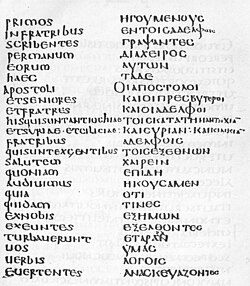Acts 15
| Acts 15 | |
|---|---|
 Acts 15:22–24 in Latin (left column) and Greek (right column) in Codex Laudianus, written about AD 550. | |
| Book | Acts of the Apostles |
| Category | Church history |
| Christian Bible part | New Testament |
| Order in the Christian part | 5 |
Acts 15 is the fifteenth chapter of the
Text
The original text was written in Koine Greek. This chapter is divided into 41 verses.
Textual witnesses
Some early manuscripts containing the text of this chapter are:
- In Greek
- Codex Vaticanus (AD 325–350)
- Codex Sinaiticus (330–360)
- Codex Bezae (c. 400)
- Codex Alexandrinus (400–440)
- Codex Ephraemi Rescriptus (c. 450)
- Papyrus 127 (5th century; extant verses 29–30, 34–41)[3]
- Codex Laudianus (c. 550; complete)[4]
- Papyrus 33 (c. 550)
- In Latin
- Codex Laudianus (~550; complete)[4]
- León palimpsest (7th century; complete)[5]
Old Testament references
New Testament references
- Acts 15:7: Acts 10:20 and Acts 11:13[6]
- Acts 15:9: Acts 10:43 and 1 Corinthians 1:2[6]
- Acts 15:10: Matthew 23:4[6]
Locations
Places mentioned in (blue) and related to (black) this chapter.This chapter mentions the following places (in order of appearance):
Timeline
The journey of Paul and Barnabas to Jerusalem and the Council of Jerusalem is generally considered to have taken place around 48 [7] – 50 AD.
Conflict over circumcision (15:1–5)
The
The dispute which arose resulted in a decision to send Paul and Barnabas to Jerusalem, to seek a resolution to the issue. In Jerusalem the pro-circumcision case was argued by 'some of the sect of the Pharisees who believed'.[11]
Council of Jerusalem (15:6–29)
The account of Jerusalem Council is bracketed by the scenes in Antioch (verses 1–5 opening; verses 30–35 closing) as an indication that the narrator shifted from Jerusalem to Antioch as 'home ground', and might not have access to the developments in Jerusalem since Peter left that city in
Verse 13
- And after they had become silent, James answered, saying, "Men and brethren, listen to me:"[13]
The council listened to
Verse 14
- Simon has declared how God first visited the Gentiles to take from among them a people for His name.[15]
Return to Antioch (15:30–35)
Armed with the apostolic decree, Paul and Barnabas triumphantly returned to Antioch, accompanied by the Jerusalem delegates, Judas (surnamed Barsabbas) and Silas (verses 22, 32), who provided encouragement and strengthening (cf. Acts 14:22), just like Barnabas, who was originally sent from Jerusalem to Antioch (Acts 11:22–24).[1]
Paul and Barnabas part company (15:36–41)
This section opens the account of Paul's second journey (
See also
References
- ^ a b Alexander 2007, pp. 1047–1048.
- ^ Holman Illustrated Bible Handbook. Holman Bible Publishers, Nashville, Tennessee. 2012.
- ^ Continuation List Institute for New Testament Textual Research, University of Münster. Retrieved March 29, 2010
- ^ ISBN 978-0-8028-4098-1.
- ^ Bruce M. Metzger, The Early Versions of the New Testament, Oxford University Press, 1977, p. 316.
- ^ a b c d "Biblical concordances of Acts 16 in the 1611 King James Version".
- ISBN 978-1-57910-527-3
- ^ M. Eugene Boring, Fred B. Craddock, The People's New Testament Commentary, Westminster John Knox Press, 2004
- ^ People's New Testament, http://biblehub.com/commentaries/pnt/acts/15.htm accessed 10 September 2015
- ^ Galatians 2:4
- ^ Acts 15:5 NKJV
- ^ Alexander 2007, p. 1047.
- ^ Acts 15:13 NKJV
- ^ The Nelson Study Bible. Thomas Nelson, Inc. 1997
- ^ Acts 15:14 MEV
- ^ Greek Text Analysis: Acts 15:14.Biblehub
- ^ Strong's Greek Concordance 4826. Sumeón. Biblehub
- ^ a b c Alexander 2007, p. 1048.
Sources
- Alexander, Loveday (2007). "62. Acts". In Barton, John; Muddiman, John (eds.). The Oxford Bible Commentary (first (paperback) ed.). Oxford University Press. pp. 1028–1061. ISBN 978-0199277186. Retrieved February 6, 2019.
- Coogan, Michael David (2007). Coogan, Michael David; Brettler, Marc Zvi; Newsom, Carol Ann; Perkins, Pheme (eds.). The New Oxford Annotated Bible with the Apocryphal/Deuterocanonical Books: New Revised Standard Version, Issue 48 (Augmented 3rd ed.). Oxford University Press. ISBN 9780195288810.
External links
- Acts 15 King James Bible - Wikisource
- English Translation with Parallel Latin Vulgate
- Online Bible at GospelHall.org (ESV, KJV, Darby, American Standard Version, Bible in Basic English)
- Multiple bible versions at Bible Gateway (NKJV, NIV, NRSV etc.)
